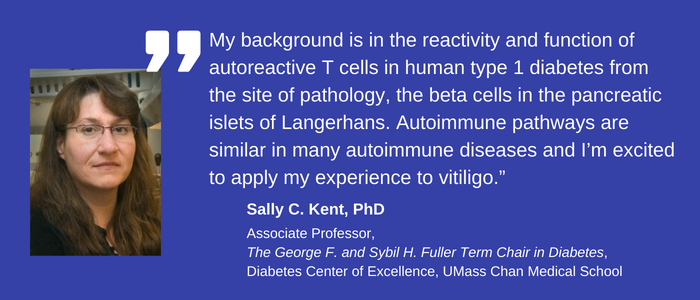Diabetes Center of Excellence Immunologist Sally Kent Investigating Autoreactive T Cell Function in Vitiligo
Date Posted: Monday, October 10, 2022Diabetes Center of Excellence immunologist Sally Kent, PhD, is participating in collaborative vitiligo research at UMass Chan Medical School. A five-year grant from the National Institutes of Health (NIH)/National Institute of Arthritis and Musculoskeletal and Skin Diseases (NIAMS) was awarded to John Harris, MD, PhD, Department of Dermatology Chair and Founding Director of both the Vitiligo Clinic & Research Center, and the Autoimmune Therapeutics Institute at UMass Chan. He is the Principal Investigator on the project entitled Dissecting Functional Autoimmunity through High-Resolution Multiomics in a Vitiligo Center of Research Translation.
Dr. Kent is leading Project 1, Autoreactive T Cell Function in Vitiligo, working with Lawrence Stern, PhD, in the Department of Pathology. Project 2, Cell-Cell Communications and Tissue Memory in Vitiligo, is being led by Bioinformatics Core Director Manuel Garber, PhD, with Jillian Richmond, PhD, from the Department of Dermatology. Core 1, High Resolution Spatial Transcriptomics Using seq-FISH+, is led by Dr. Harris with Cai Long, PhD, at California Institute of Technology.
Vitiligo is an autoimmune disorder that results in the loss of skin color. The patches of discolored skin usually get larger with time. It typically starts on the hands, arms, feet, and face but can also affect hair and the inside of the mouth.

“There is no known therapy for ‘turning off’ the autoimmune response involved in vitiligo”, said Dr. Kent, Associate Professor and The George F. and Sybil H. Fuller Term Chair in Diabetes at UMass Chan. “My background is in the reactivity and function of autoreactive T cells in human type 1 diabetes from the site of pathology, the beta cells in the pancreatic islets of Langerhans. Autoimmune pathways are similar in many autoimmune diseases and I’m excited to apply my experience to vitiligo”.
This research is intended to determine the mechanisms by which autoreactive T cells navigate the skin, communicate with neighboring cells, engage and destroy melanocytes, and create long-term memory of autoimmunity directly within vitiligo lesions. The goal is to better understand and create therapeutic approaches, and to gain insight into the autoimmune process of other human autoimmune diseases.
To learn more about vitiligo, the research conducted at UMass Chan, or any ongoing vitiligo clinical trials, visit the Vitiligo Clinic and Research Center’s website.

